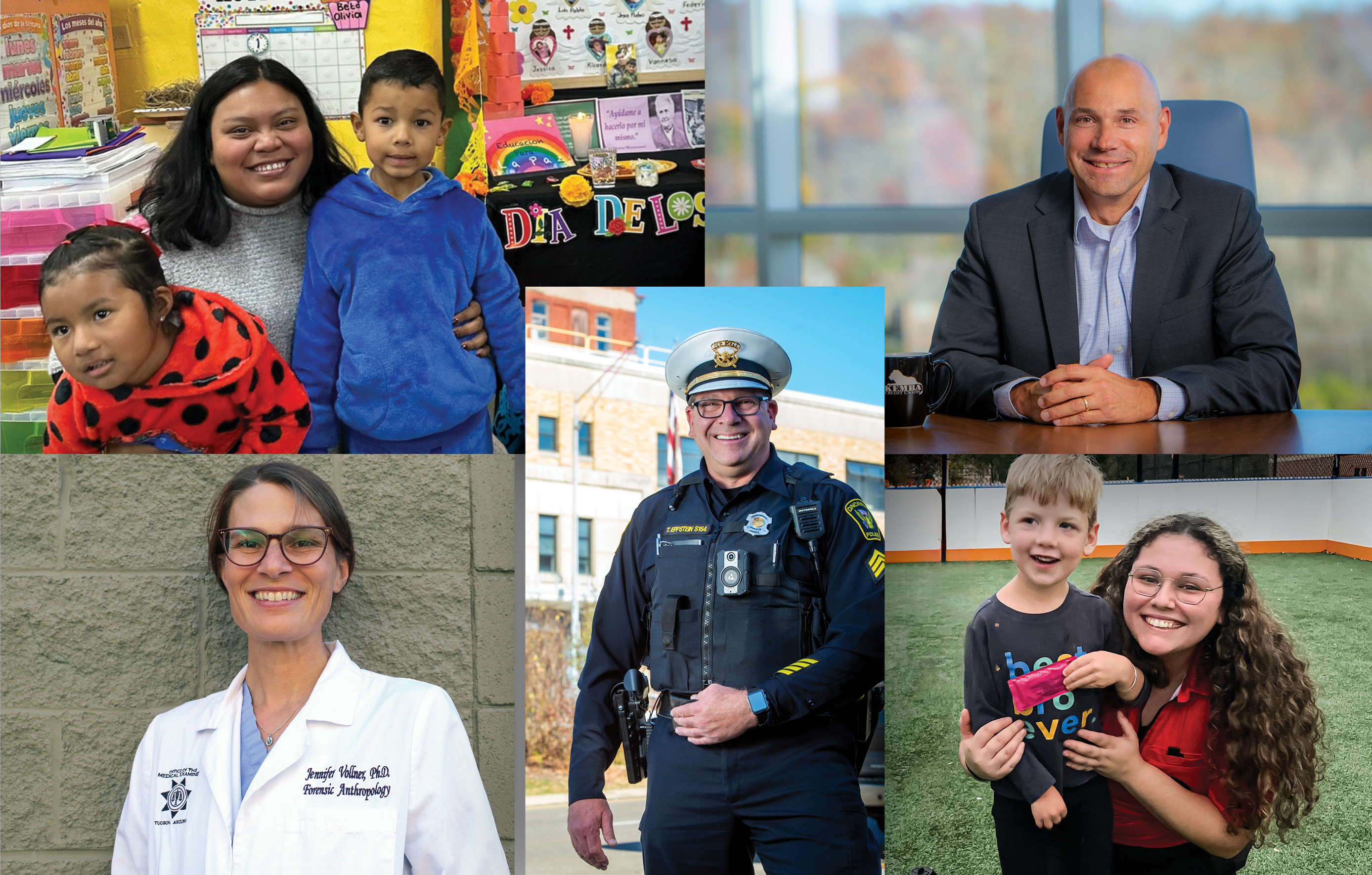
14 minute read
Lighting the Way
From the heart of the Mount’s campus to far-reaching corners of the world, there is a shimmering thread that binds our alumni and students—a commitment to a life of service. Our institution has always championed the idea that true success is measured not just by personal achievements but by the positive impact one leaves on the world.
Here, we’re spotlighting five remarkable people who have truly embodied this ethos. They are the torchbearers of our legacy, lighting the way for future generations with their unwavering dedication to making a difference.
Reporting For Service
By Jessica Baltzersen ’13
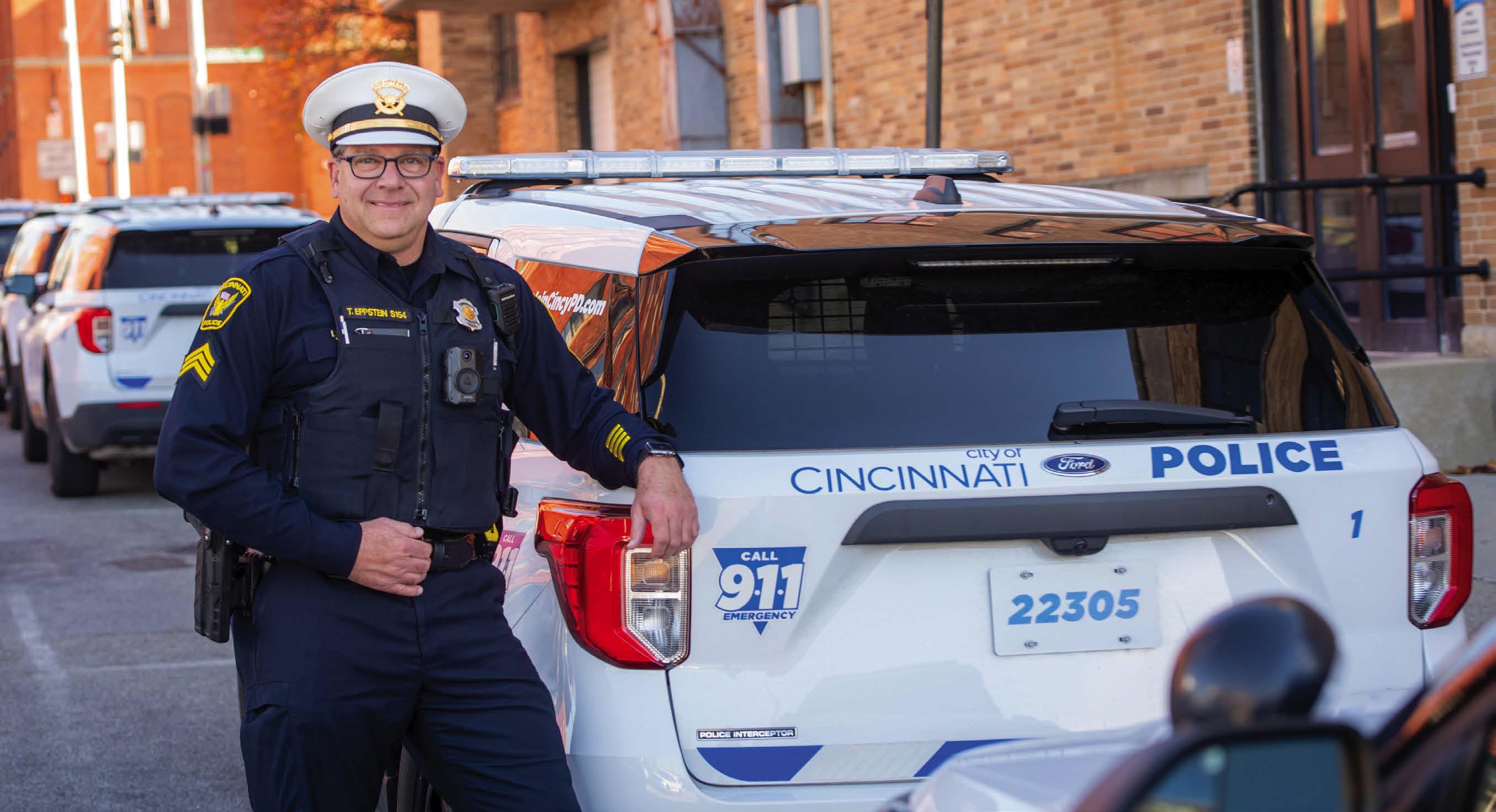
When Tim Eppstein ’96 first attended the Mount to become a Roman Catholic priest, he probably didn’t imagine that he’d become a S.W.A.T negotiator and a sergeant. A theology major with intentions of joining the priesthood, Eppstein says he ultimately decided that he one day wanted a family. Still committed to a life of service, he switched to socio/psychology with a minor in philosophy, and later earned a master’s in community counseling from the University of Cincinnati.
“No matter where my career went, I knew I wanted to do jobs that would give back and make the world better,” Eppstein says.
In 1994, Eppstein gave a lecture at Camp Joy, a nonprofit that runs programs for disadvantaged youth. For 29 years he’s been an integral part of the organization, leading experiential education for adult programs. The Cincinnati Police Department recruited him at Camp Joy.
“I was always impressed with their professionalism and their training staff… and policing really seemed like it would fit my interest and skills,” Eppstein says. “So after a few years of mulling it over, I decided to join.”
When he became a police officer in 2003, he noticed that many colleagues had become cynical and unhappy over time. He sought out officers close to retirement who were still full of life and inquired how they stayed happy. Their responses came down to three things: Don’t overwork yourself; find a spiritual or positive community space; and develop an identity beyond the uniform. For Eppstein, that advice would become paramount when coping with the difficulties that come with the job.
On September 6, 2018, tragedy struck when an active shooter killed three people and wounded two others in the lobby of the Fifth Third Bank building on Cincinnati’s Fountain Square. Eppstein’s wife worked at Fifth Third Bank and was in the building when the mass shooting occurred.
“I was a couple of blocks away in a meeting when she texted me,” Eppstein says. “I saw the message and ran to address the situation.”
Eppstein later received the Police Chief’s Award for Distinguished Service for arriving on the scene and assisting in the clearing of part of the building that day. He also rendered life-saving aid to victims of the incident.
Today, Eppstein is a sergeant, S.W.A.T negotiator, and supervisor of the Place Based Investigations of Violent Offender Territories (PIVOT) program. He’s the neighborhood patrol officer in Over-the-Rhine and works heavily with social workers and the homeless population to bridge a relationship of trust. By partnering with organizations like Shelterhouse he brings resources to those experiencing homelessness and helps train staff.
“These trainings have allowed staff to learn, practice, and apply de-escalation techniques when working with our homeless clients that provide everyone with a safe and secure environment,” says Jim Armbruster II, director of shelter operations at Shelterhouse. “Tim has been a tireless advocate for the street homeless, working to get them sheltered day and night. Tim has this unique ability to truly meet people where they’re at and communicate with them… he is one of a kind in my opinion and his efforts continue to help countless people.”
Answering Silent Stories Of The Desert
By Jessica Baltzersen ’13
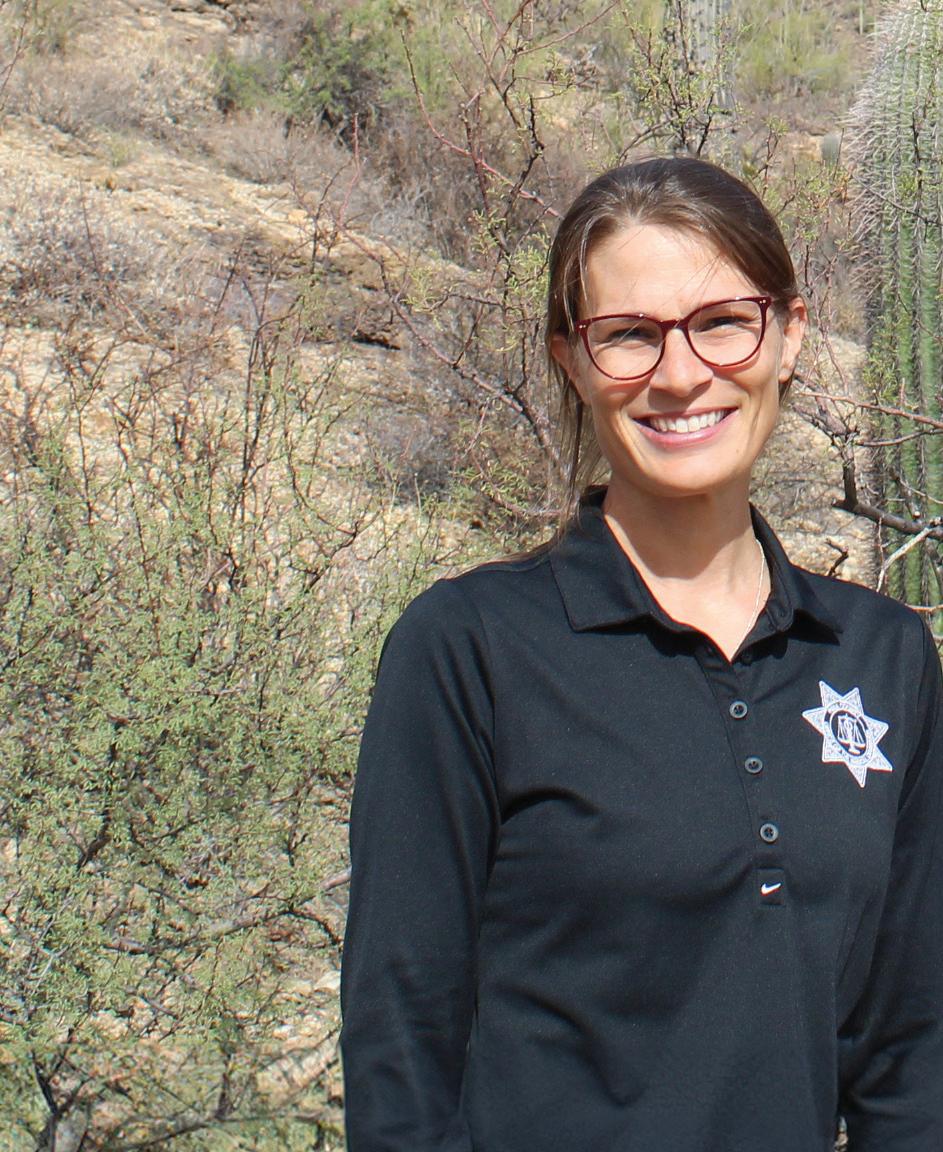
Pima County, Arizona, sits on the edge of the Sonoran Desert, an unforgiving landscape along the U.S.-Mexico border that claims the lives of hundreds of migrants each year. Since 2000, there are still 1,379 cases of unidentified deceased undocumented border crossers (UBCs) in Pima County alone. Forensic anthropologists like Jennifer Vollner, Ph.D., ’07 are working tirelessly to identify UBCs to restore their names and return them back to their families.
Vollner earned her biology degree from the Mount, her master’s from Mercyhurst College, and her Ph.D. from Michigan State. She always had an interest in forensic sciences but knew that job opportunities were limited. She credits MSJ faculty for their unwavering support.
“Dr. Beth Murray is the reason why I’m sitting here,” Vollner says. “Having her experience and connections really helped open some doors for me, and it continued even when I was in graduate school and into my early career. She never left me as a mentee. I joke with her now that she’s my ‘anthro mom,’ or my ‘academic mom,’” Vollner says.
Vollner specializes in the identification of skeletal remains and is on a team of three in-house forensic anthropologists in Pima County.
The challenge lies not just in the recovery, but also in giving a name to the anonymous. The brutal conditions of the Sonoran Desert often leave only skeletal remains, making the process long, complex, and dependent on costly DNA analysis.
“The extreme heat, the beating sun, and the lack of shade, water, and food leads, unfortunately, to a fatal experience,” Vollner says. “We have individuals going from recently deceased and visually recognizable to skeletonized much quicker than in other parts of the country.”
Pima County partners with a network of dedicated organizations such as foreign consulates, U.S. Customs and Border Protection, Non-Governmental Organizations, private labs, and sometimes even the FBI to aid in the identification process. Finding the families then becomes its own challenge, with many individuals coming from very rural areas speaking only indigenous dialects. In these cases, the consulates play a crucial role.
“A common misconception is that these folks are all criminals,” Vollner says. “The act of undocumented crossing is not legal. But many of these migrants are trying to get back to their families after being deported, especially those with U.S.-born children. We also see a lot of first time crossers who are trying to get a job to support their families back home or escape dangerous situations in their home country. We run migrants’ fingerprints and DNA through our U.S. criminal databases with often no hits to a previous criminal act.”
The Pima County office has about a 64 percent identification rate, “which is pretty good because there are a lot of hurdles,” Vollner says. “No matter how long it takes us, we never stop pushing and we never stop investigating. As time goes on things will get better here and answers will be provided to families quicker. Even if it doesn’t seem like it, there is a lot of hope.”
Leadership Steeped In Mission
By Amanda Gratsch ’15
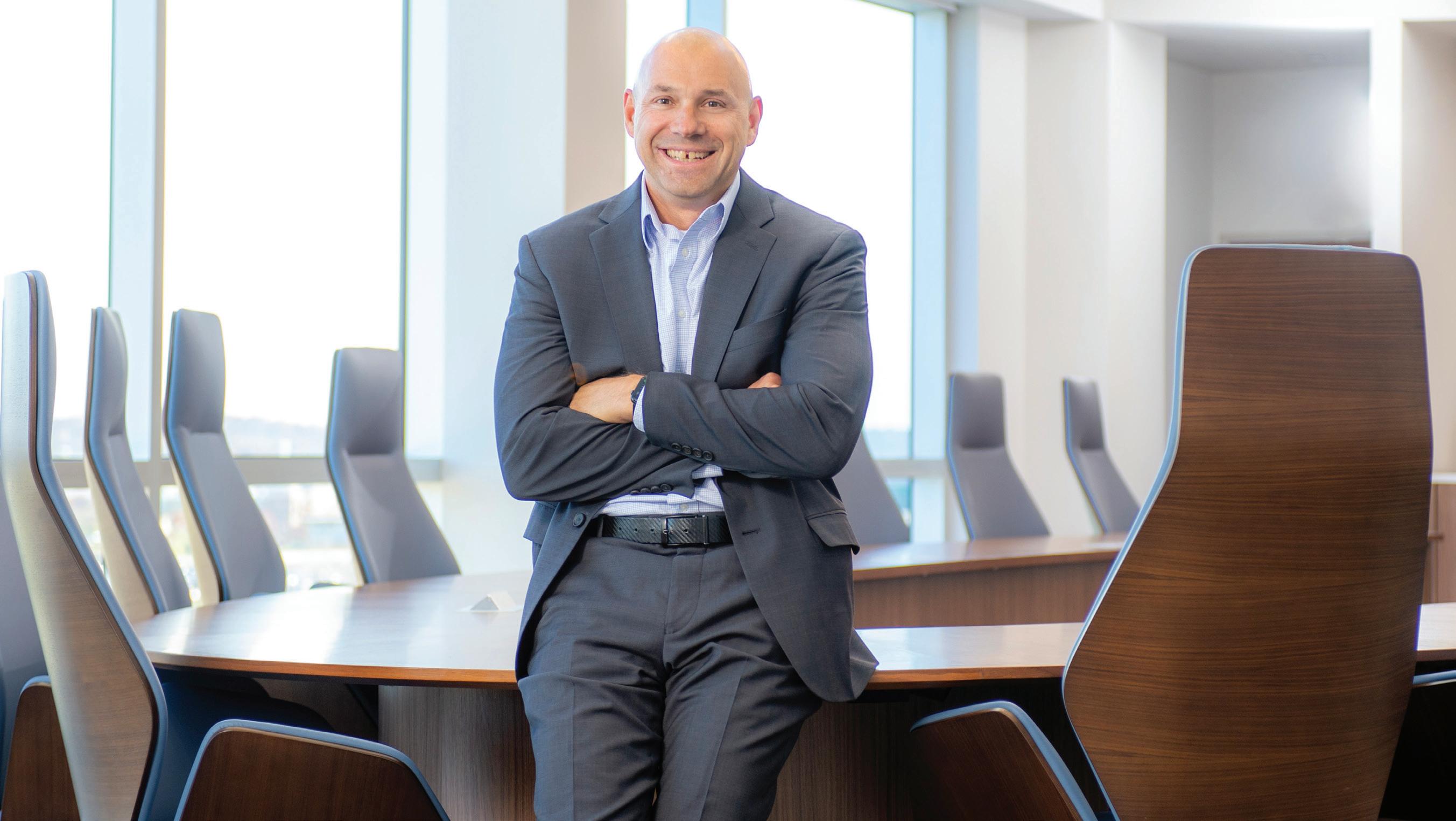
Arriving at a 24-year milestone as a financial executive is no easy feat, but one filled with tenacity, forward-thinking, and building strong relationships. To double alumnus Dan Sutton ’08, ’95, it’s about serving as a role model, permeating honesty throughout organizational culture to uphold ethical intentions for the members the business serves.
Sutton lives and breathes this mission. Since 1999, he’s made strides in his career, serving the last six years as Kemba Credit Union’s president/chief executive officer. Leading a financial institution comprised of 130,000 members and nearly 300 employees, Sutton says he draws energy from all facets of his job—the work he accomplishes, the members he serves, and the employees he works alongside.
According to Sutton, Kemba diligently strives to enrich the financial lives of its members, employees, and the communities it serves. It embodies a culture of care and concern for each other, and for others. His most transformative experience was having the privilege to lead through the COVID-19 Pandemic, where he witnessed a profound level of service and care from his staff.
“I was able to sit in the front row and witness our staff bravely serve our members and care for each other,” Sutton says. “I have never been more proud of our Kemba family than I was during those very difficult times.”
An advocate for guiding and coaching, it was only natural that he pursued an advanced program to lead with values, integrity, and social responsibility.
“The Mount’s Master of Science in Organizational Leadership Program (MSOL) offered me an opportunity to sharpen leadership skills that I already had, but most importantly, it helped me identify leadership areas that were not as strong or developed in order to be successful in a leadership capacity at the highest level,” he says.
When faced with difficult business decisions, Dan often draws upon his MSOL experience, giving him the confidence to make tough calls and face change head-on when his back is against the wall.
“Most importantly, it taught me to embrace change, whether it’s changes in technology, consumer/employee demands, rules and regulations, competition, and much more,” Sutton says.
In fact, the best leadership training Sutton says he received over the years was from his coaches. His former MSJ Football Coach John Pont, a previous member of the Mount, made a recognizable impact on the person and leader who he is today.
“Coach Pont taught me how to work hard and get my hands dirty,” Sutton says. “He taught me how to effectively lead others and create followers. Coach Pont was inspirational, charismatic, caring, and the poster child of a servant leader. He treated our football team as a family. He cared about our individual success on the field and in the classroom more than he cared about winning football games.”
As for steering the business towards a successful future, Sutton continues to put this care and concern at the forefront of Kemba’s service to meet business objectives.
“My broad vision for a successful future for Kemba Credit Union is for all individuals and small businesses to think of us first for all their financial needs,” Sutton says.
A Higher Calling
By Jessica Baltzersen ’13
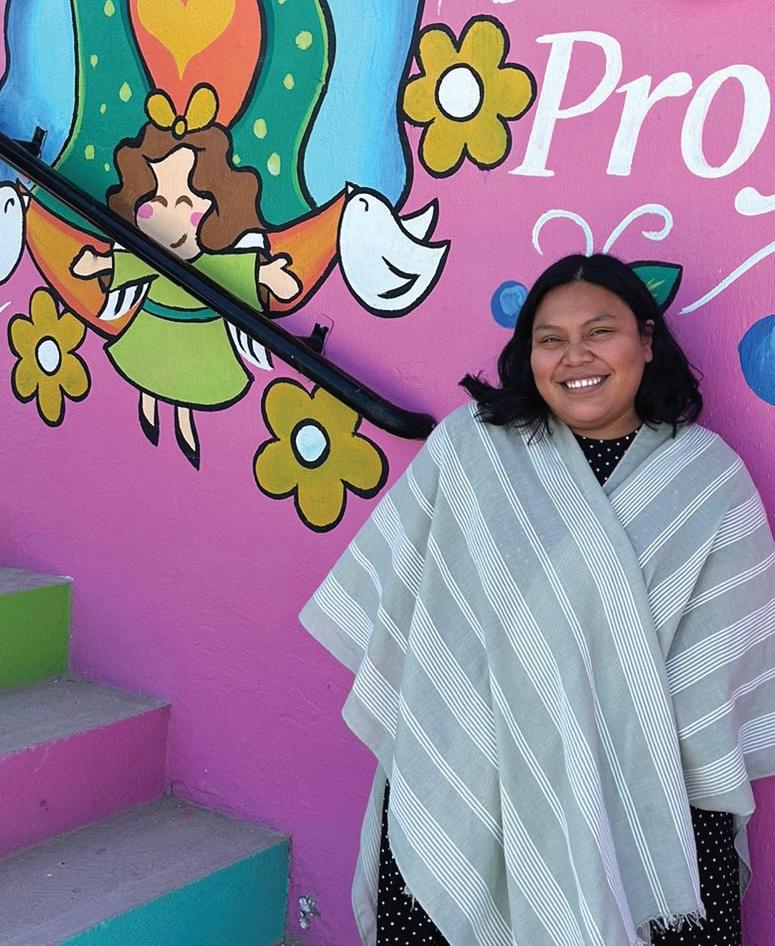
Sandra Ramirez ’23 has passionately championed immigration reform, an issue close to her heart. Her parents immigrated to the United States from Guatemala with nothing except the hope for a brighter future.
While the U.S. stands as a beacon of freedom and promise to many, the path to realizing that dream can be far more intricate and challenging than we realize.
In 2017, Ramirez was separated from her brother due to the immigration system, and much of the legal responsibility fell on her shoulders as a teenager.
“I was the oldest and I’m bilingual so I had to do all of the translating, meeting with the lawyers, and visits to my brother at the detention center,” Ramirez says. “Having that traumatic experience as a young child really affected me. It opened my heart to see that millions of families go through this every single day and their stories aren’t being told.”
Since then, Ramirez has dedicated her life to the cause. While working on her education degree with a dual licensure in primary and special education (K-12) at the Mount, she knew education was the key to making a change.
In college, Ramirez was involved in immigration advocacy work through the faith-based organization, Ignite Peace. She also tutored bilingual children at Cincinnati Public School’s LEAP Academy and received the English Language Learning Foundation (ELL) Tutor of the Year award.
“So many of these children came to the U.S. from countries like Mexico and El Salvador, and it was touching to have them trust me and learn about their experiences,” Ramirez says.
Today, Ramirez lives in New Mexico and crosses the U.S. border every day to the colonia of Anapra, Mexico, to teach at the Santo Niño Project—a Montessori school started by the Sisters of Charity Cincinnati that serves children with special needs.
Not only do these students receive an education, but it’s one of the only schools in Mexico that offers in-house resources for physical therapy, speech therapy, and occupational therapy to student’s families—completely free.
The Santo Niño Project has plans to acquire the building next door so they can create a bigger school with more classrooms, more teachers, and more services to expand their outreach.
“For me, I want a future that’s loving, caring, and embodies the verse Matthew 25:35-40,” Ramirez says. “I believe that we are to love our neighbors. We are here to support and care for one another. And that’s what this little school is doing.”
Ramirez has even started her own discernment process as she works toward joining the Sisters of Charity.
“I never thought I would be here but it turns out that it was definitely where God wants me,” Ramirez says. “I get to wake up every day saying yes to this feeling of deeper joy, love, and purpose. If you ever wonder what the Sisters of Charity do, reach out and explore. You will meet some inspiring and empowering women who live the Gospel every day. It’s also a chance to reflect and ask yourself, Am I someone that’s called for religious life?”
A Passion For Giving Back
By Jessica Baltzersen ’13
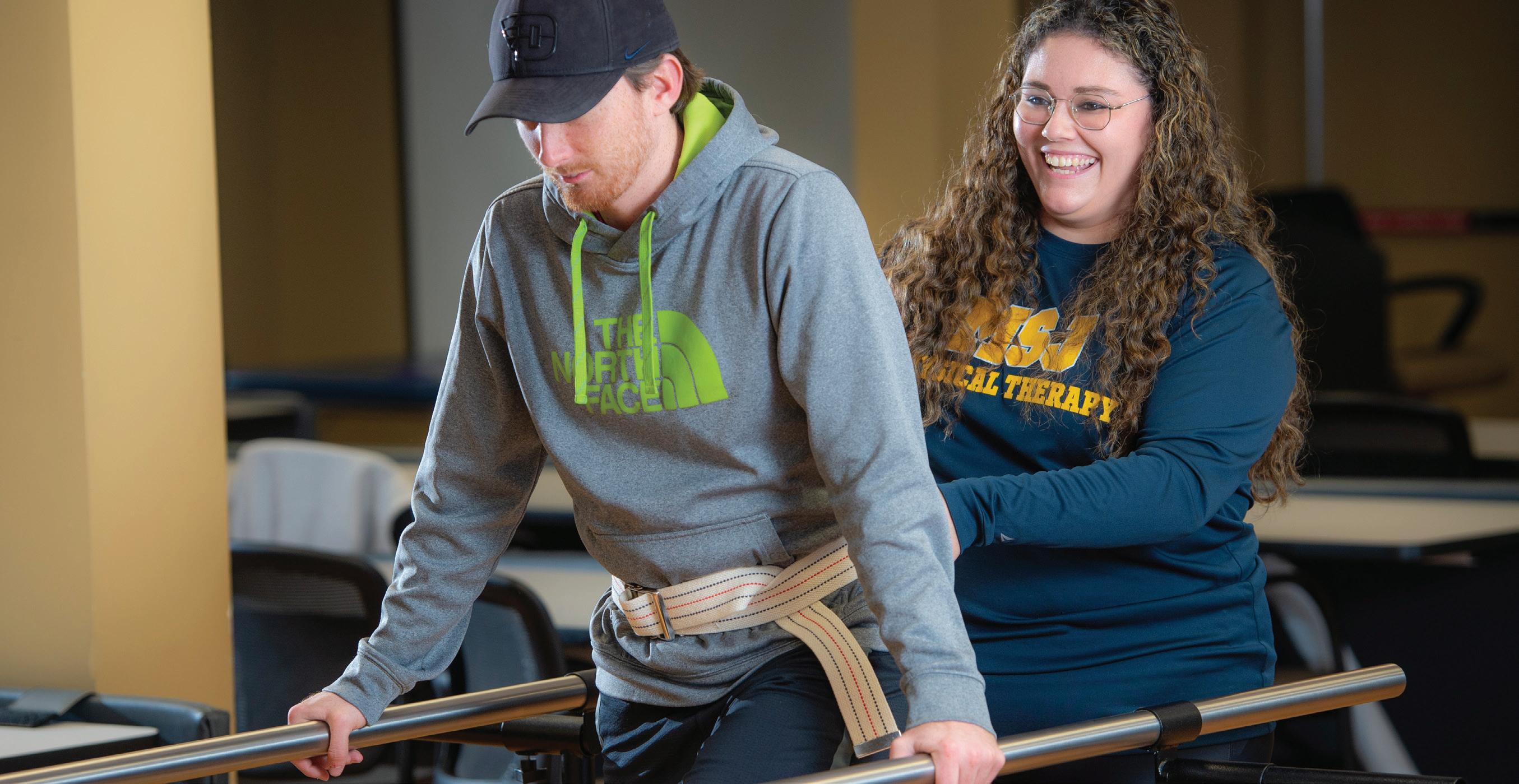
Ileta Pizano’s passion for physical therapy was not accidental; it stemmed from personal experiences that shaped her calling. During her undergraduate education at The Ohio State University, Pizano became the caregiver of a stroke survivor, which turned into a five-year commitment extending into the challenging times of the COVID-19 Pandemic. Guided by her cousin, an occupational therapist, this experience allowed Pizano to understand the broader scope and importance of therapists.
Choosing MSJ’s Doctor of Physical Therapy (DPT) Program was a decision driven by the University’s resources and closeknit community.
“I am so proud to be an MSJ student,” Pizano says. “Here, I’m not just a number. The faculty really care about you. Professors like Dr. [Christina] Heinrich and Dr. [Eric] Schneider motivate me to be better and inspire me to be a really good therapist,” Pizano says.
Growing up in poverty with a single parent, Pizano faced numerous challenges as a first-generation college student striving to achieve her education. Undeterred by these hurdles, she possesses a strong passion for giving back by volunteering through various organizations and initiatives, one of which is the MSJ student-led pro-bono Physical Therapy Clinic, a place where she gets a hands-on opportunity to apply her knowledge and provide free services to people who may be uninsured or underinsured.
“I feel that it is my duty gaining privilege as an educated individual to provide pro-bono services to those who are less fortunate,” Pizano says. “A lot of people don’t have the opportunity or accessibility to healthcare, and providing that to others can change their lives completely.”
Pizano is also the adaptive sport lead for her cohort and volunteers for just about every activity that the faculty arrange for service with adaptive sports.
“I got involved with adaptive sports because, for financial reasons, I never had the opportunity to play sports as a child,” Pizano says. “But more importantly, I wanted to help individuals with disabilities. I became immersed in an environment where I got a new perspective of life and what life for others is like.”
She’s been involved with organizations like Cincinnati IceBreakers Sled Hockey and CP Soccer for people affected by cerebral palsy, stroke, or traumatic brain injury who are ambulatory.
Betsey McCamish, whose son, Rory, has cerebral palsy says the reality of having a child who physically can’t keep up with his same-aged peers means her son’s opportunities are different and his activities can be limited or they must be adapted.
“Ileta dedicating her free time to coaching Cincy CP Soccer athletes has unlocked our family’s entire outlook on Rory’s potential and his future playing sports or recreation,” McCamish says. “[Ileta] knows just the right moments of when to instruct, or assist, or adapt, or encourage, or challenge, or hold his hand, or carry, or just make him giggle. The way Rory’s eyes and smile light up when he’s empowered by Ileta is undeniable and contagious. But most importantly, the way she and the other volunteer coaches make him feel capable and included and happy is the greatest joy any parent can ever hope for their child .”




